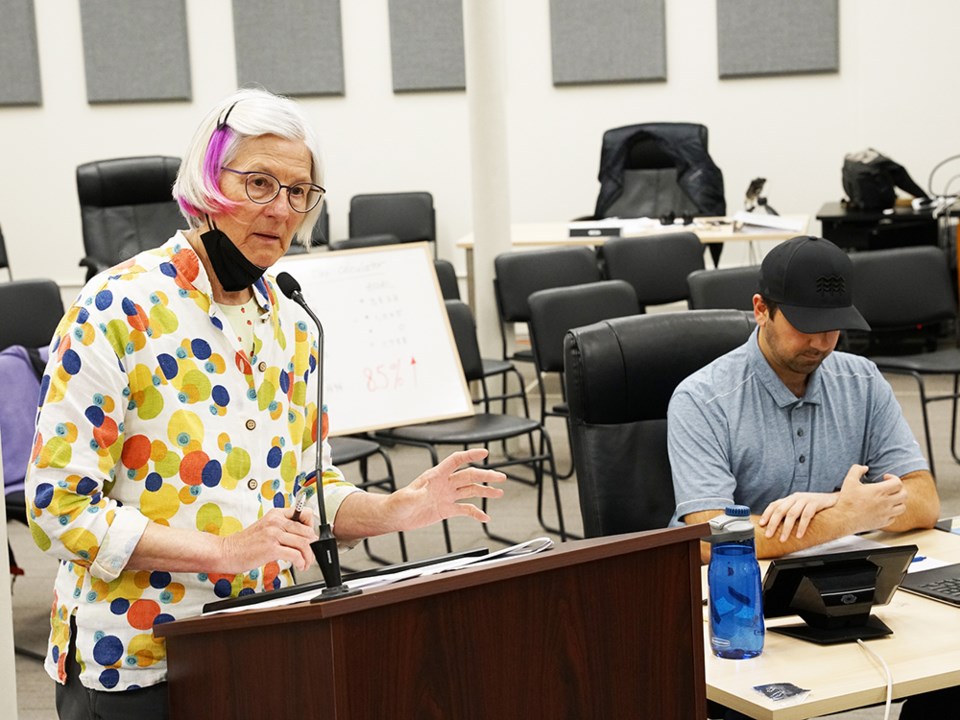City of Powell River councillors gave the first three readings to the five-year financial plan and property tax rate bylaw amid concerns expressed by a taxpayer.
At an April 21 meeting, interim chief financial officer Mallory Denniston provided an overview of the 2022 to 2026 five-year financial plan and annual property tax rate bylaws.
Denniston said plan assumptions were presented in August 2021 at the finance committee meeting and based on direction from that meeting, a preliminary plan was presented in November 2021.
“The main guiding principle was no more than a 4.1 per cent increase to the total tax levied; that’s about $800,000,” said Denniston. “Based on the direction from this meeting, draft one of the financial plan was formed and presented in January 2022. Based on the direction from the January meeting, draft two was formed and was presented in March 2022. That plan has now been referred to this meeting.”
Denniston said to summarize, there are no changes to the overall plan and taxes to be levied, and the information has been received to complete the property tax bylaw.
She said council is required to have the five-year financial plan adopted annually by bylaw before the annual property tax bylaw is adopted, and it must set out objectives and policies of the municipality for the planning period in relation to funding sources, the distribution of property value taxes among the property classes, and the use of permissive tax exemptions.
Denniston also outlined a change in the forecast budgetary surplus. She said former chief financial officer Adam Langenmaier had originally reported there would be about a $900,000 surplus, but after the March finance committee meeting, he determined an error was found in the property tax calculation spreadsheet.
Denniston said the surplus is actually a $200,000 surplus that will be remaining with this tax levy.
“We still have $200,000 to discuss where to allocate once we know the reserve balances in May,” added Denniston.
Taxpayer Kathryn Hjorleifson, who lives on a fixed income, attended the council meeting and said she had conducted an analysis based on the city's tax calculator. She said the average single-family dwelling in 2022 in the city is assessed at $535,928. Hers is $476,000 and her taxes will go up more than the council-mandated amount for total tax levy increase.
“I don’t agree with the rate increase but I’d like to say something for the future,” said Hjorleifson. “I do not think it’s fair to the citizens of this city to put out something at the beginning of the process that says to the staff people, keep this at 4.1 per cent. What you are talking about is one part of it. You end up at 6.6 per cent.
“When you direct people, you need to direct them on the whole package. We might not have liked the 4.1 per cent, but I thought I was battling 4.1 per cent, not 6.6 per cent.”
What Hjorleifson is referring to is that the total City of Powell River tax levy is going up 4.1 per cent in 2022, but the impact on the average single-family-dwelling taxpayer is a 6.6 per cent increase.
“In the end, what we look at, is that, and we all know it’s killing us,” said Hjorleifson. “When we take money from citizens, the first rule should be, can it be zero?”
Increases versus cuts
Councillor George Doubt, who chairs the city’s finance committee, said councillors asked staff to prepare a tax increase of 4.1 per cent.
“I am of the belief it is the minimum tax increase we can have in order to maintain the services the city has,” said Doubt. “Anything less than that would require reducing services.”
Councillor Maggie Hathaway said the only way to keep it at zero is to reduce services.
“We actually talked about that at one point several years ago, and we said maybe we could cut some programs at the recreation complex, and you get a huge outcry from the people,” added Hathaway. “So, what can we cut? It gets very difficult.”
Hjorleifson said taxpayers would be making all the hard decisions councillors don’t want to make.
“They will be making the decision they will not have that to eat,” she added. “Or, okay, my kids are not going to go to the recreation complex three times a week, they are going to go twice. All of us now, with inflation, are being asked to make those decisions. The world has changed and we have to ask the question: Do we have to do this this way?”
Councillor Cindy Elliott said she is disappointed there is not a budget at no more than 4.1 per cent for the average household.
“I thought that’s what I voted for,” added Elliott. “I believe we had a scenario with that in it and I was in favour of that scenario.”
Council unanimously approved the first three readings of the five-year financial plan and annual property tax rate bylaw. A vote for final adoption will take place in May.


.jpg;w=120;h=80;mode=crop)
